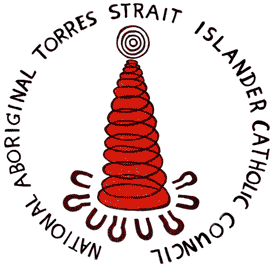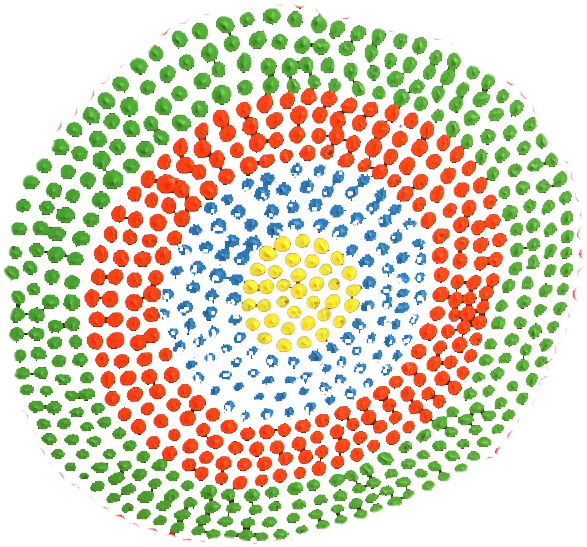

National Aboriginal and Torres Strait Islander Catholic Council
The use of Deacon Boniface’s image has been approved for publication in Catholic media by his family.
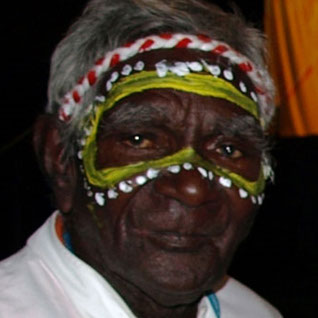
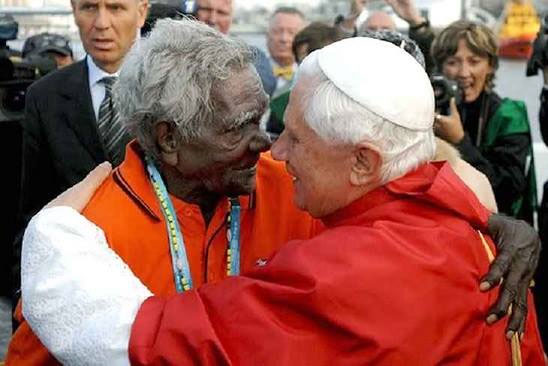
It is with heavy hearts that we farewell Deacon Boniface Perdjert, who went to God on Monday - March 18 2019 - following an extended stay in hospital.
Deacon Boniface, who was 82 blazed a trail for Aboriginal and Torres Strait Islander Catholics to follow as he not only walked between two worlds – Catholic and Traditional – he brought them together. His words and actions spoke loudly to the members of the Wadeye Community – of which he was a deeply loved and respected Elder – but also to the Catholic Hierarchy with whom he shared his wisdom on many official occasions.
He was ordained the first permanent Deacon in Australia at Port Keats on July 19th 1974 by Bishop John O'Loughlin, the Bishop of Darwin and in November 1986, Boniface assisted at the Mass celebrated by now Saint John Paul II in Alice Springs when he delivered the famous address to the Aboriginal and Torres Strait Islander people. He again assisted St. John Paul II at the beatification Mass for Mary Mackillop in Sydney in January 1995. A special article was produced by NATSICC to mark Deacon Boniface's 80th Birthday in 2016.
A man of extraordinary faith, Deacon Boniface was able to describe the ways in which his culture and faith came together. He once described this relationship by saying “Jesus told us we have to love God with whole hearts, mind and spirit that means the whole of me and the whole of me is Aboriginal. There is no other way for me to love him.” Simple yet powerful.
As the wider Catholic and Aboriginal and Torres Strait Islander communities grieve alongside the community in Wadeye, the members of NATSICC ask that you keep Deacon Boniface’s words in your hearts and continue the journey that he started all those years back by expressing your faith and culture in a way that is meaningful to you and enlightening for the Australian Catholic Church as a whole.
The story of Deacon Boniface Perdjert
The following transcript was taken from a cassette recording stored at the NATSICC Office. We have been unable to identify a location and date on which Deacon Boniface provided the below address.
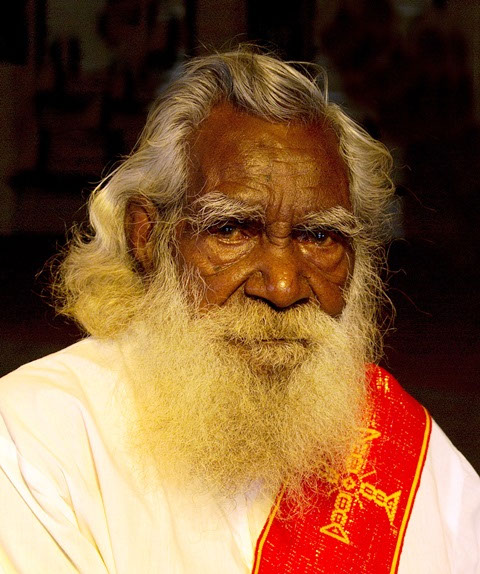 Good Morning my Brothers and Sisters of Christ, firstly I grew up at Port Keats, I was taught by the Missionary of Sacred Heart and I learnt a lot from the Priest. My Father taught me how to hunt and fish and do all the Aboriginal things but the Priest taught me the religious and catholic faith.
Good Morning my Brothers and Sisters of Christ, firstly I grew up at Port Keats, I was taught by the Missionary of Sacred Heart and I learnt a lot from the Priest. My Father taught me how to hunt and fish and do all the Aboriginal things but the Priest taught me the religious and catholic faith.
I was born Neeple Boniface Perdjert at birth I was given my name Neeple, at Baptism I was given that name. I was the first baby baptised at the Mission 57 years ago. My Father’s name was Perdjert he was Muripatha my Mother’s name was Bullimbi, she was baptised Agatha, she is still living. My father had 4 wives. He was baptised Richard before he died same as my Mother.
My wifes name is Numple baptised Bridgette, I have three daughers Mingie, Alloygoy, Demuratug. Florence, Margaret Rose and Mary The first Mission girl was baptised on the coast due to the sandy soil, lack of water and a small tidal wave it was moved inland to where it is today.
I set the foundations at the first school, set out in the middle of the big vegetable garden; it was surrounded by working relatives and friends. They also discovered what the school was all about. No doubt they gave some support to the students by their presence it was a community school.
Brother John Pie now 87 was a better footballer than teacher the garden workers were a moving population. There were three main tribes each took their turn to stay in and do their work while the others leave and hunt back in their country. I had a longer period at school when my father and his people went bush and I joined the Moigabin Group my mothers people.
Even though there was a lot of fighting and killing between the tribes I managed to grow up in the security of the big family. We were the big family because there were 13 Muripatha Countries surrounding around the coast. We knew the name of every country and our language of course and all kinship skins. He told me how I was to address all relations as well as my blood relations. They were my tribal relation.
That makes a family very big and very close. Our kinship system not only gives us the correct title for each person but how we were to behave towards each other. For example my mother’s brother Nigick was for me a very important person. I had to treat him with great respect I had to listen very carefully to what he said and he was the first to teach me the law. He taught me hunting. I knew not to overstep the mark.
He would correct me mostly by word or advice. The consequence was physical punishment, he got the stick out or sent me off to another place where another relation lived. The various ceremonies keeping our family relationship strong.
When I was 10 years old I was put through pre initiation called Javen, you have group of boys together from three different language groups. The old man from his group decides where the Ceremony would be and who be in it and where it would be.
The main purpose of this Ceremony was to give us our first serious introduction to the law been brought together in such a way for the sole purpose for a family bond was built up between us, both boys and men. We were taught the sacred song this song never changed they are sung in the Ceremony language that all know.
The seven Ceremonies are also for young girls they are also taught the law in the same song. Having been put through the Ceremony both Boys and Girls are given the title Jawin. A title that is content remains to each of the important of the Ceremony. The Young men Ceremony follows a year or two later the Muripatha boys are taken from their Countries and their Families. They come under the authority of several of the old men for a period of three months.
In this period they undergo further learning of the law and discipline and establish strong discipline mainly by instruction they had to teach to learn the old men they must stay with them they also hunt with them learning the skill this was a peaceful time and a happy time for the boys they were to prepare to be responsible for their families. The dance and songs particularly from the east group would be done each night to the group.
After three months the different groups would return to their own country where the circumcision was performed in the proper ritual for this occasion all the family would come together to prepare for a special meal this was called muninum.At the Ceremony each boy receives the name according to the song and dance that was performed at his request of the family for example “wanga” forever until he dies he is called by that name the final Ceremony at Port Keats is called Pun in other places it is called Kunipipi.
This Ceremony is Mens business it is a step along the way to proceed and depending on the knowledge and the living the law in this Ceremony the young men ritually die and come to life again they now have a new life and receive higher knowledge, the Ceremony continues for several months particularly from the neighbouring and tribal groups.
After two years this Ceremony with the young men would be married, the marriage is arranged by the parents according to the promised system. The totem is something that widens a sense of family; my own totem is the black cockatoo.
They take this totem to Arhnemland and no doubt in the other places when I meet someone with the same totem I feel the same sense of family and relationship with that person. It would be wonderful to have a totem that would bring all Aboriginal people into the same big family. I would like to think in the presence of the inauguration of faith; the cross might become that totem.
I remember clearly when our group was overseas in 1975 whenever we saw the cross no matter what country; we felt that relationship and the feeling of the family and of feeling of being at home.
Dream site binds family together and that brings extend to our family these Muriputha people group as it’s own, in my Country they are Black Cockatoo, Milky Way and Little Bird this side brings shared Muripatha family under the one big family called Iminin.
This family owns special song connected with a dream site, they children are taught about their dream site and song; the children are also taught how all these sites link up along the track of the dreamtime figure.
A three song dance is performed already mentioned Janba, Wanga and Litga also an extended family these dances are shared over the varse range of the country from Port Keats to Daly to across to Western Australia it is not just the song but the religious thing behind them that matters though these people all have their own special songs and dance to share with us.
From what I know of story of the Rainbow Serpent It is a religious significance extends through the whole of Australia making all Aboriginals one big family. In recent years a lot of thing has come into our lives that are doing great damage to the things I value. Let me speak briefly about some of these; after the Mission had gone several years Father Dockety noticed there were several aspects of Ceremony that in his eyes were morally wrong.
He condemned the Ceremony so there was big argument my Father and a few others took the side of Father Dockery. I had to admit the abuses that suddenly came in view of the corrupt side of the human nature. I remember clearly great tension of that time when I was preparing for a Deacon for over 20 years I was worried because I was convinced that the old way and the new ways should come together in fact to come together the old way was very much part of me.
Jesus told us we have to love God with whole hearts, mind and spirit that means the whole of me and the whole of me is Aboriginal. There is no other way for me to love him. I spoke a lot about this to Father Leary because being a Deacon meant I have to bring myself, my culture and my Faith together. I came to realise that Father Dockery did not see that condemning the abusers he was also condemning the Ceremony itself.
Saint Paul condemned those who are abusing the Eucharist he did not condemn the Eucharist itself. After I became a Deacon the eldest of the Imini people came to me and discussed receiving the Ceremony. I was in complete agreement, so now we have our Ceremony .In the last Ceremony a few months ago we actually had mass on the Ceremony grounds I organised a Liturgy including the Muchinga song of the Ceremony sang during the mass.
I was Deacon at the mass as well as the leader of the Ceremony. It meant so much when the Faith and Culture met at such a deep level. The old way and the new way have certainly come together.
Another thing that worries the older people is that the young people are losing many of their traditions and the sad break down of authority at the family and community so many things causes them pressure and we have no time to handle them. Our priority have become confused more important thing like the Ceremony have been cut short because of so many other things that have to be done. We have not had enough time to sort things out.
I like to compare what is happening with the eating of the food if we eat the wrong food or if we eat good food too quickly we end up sick and die. In our culture we knew what good food to eat it was it was all healthy so with all the new things that have come into our lives we have no time to sort out the good from the bad. What will nourish us as an Aboriginal or what will finally destroy us we are left I suppose, to learn from our mistakes but when mistakes multiply confusion sets in there’s little space time for learning.
It has been my purpose in this talk to tell you, firstly I have been brought up in the traditional way, secondly in the short space of time many of the traditional values that make up mine and the lives of the old people have been threatened. To the sorrow of the old men to the greatest loss of the young.
Lastly let me tell you how important and necessary to proceed and strengthen our Culture in our Catholic Faith. I see remedy for what is going wrong coming from inspiration and the strength of the faith. The faith will bring us together the faith will shelter us and let us listen to ourselves and to one another at the very deep level. The faith will encourage us enlighten us and strengthen us to share and minister to one another no matter what part of Aboriginal we belong to the faith, will make us one family.
As I said earlier as a Deacon, it became my duty to bring the faith church and the culture together. I know Jesus did not come to destroy the Culture he came to fulfil it he measures his men in all Cultures his spirit allows all to reflect in their own Cultural way.
There is a special privilege that is their offering to Jesus any church rather than their way of being to Jesus and any Church. Each measures his men to show in any Culture so that what is good grows stronger and what is bad grows weaker and hopefully disappears so people of Culture properly and become strong.
I believe that in those arguments in the early days about Ceremony were really experiences and challenges from the Culture to the gospel .The result were removal of the bad and destruction and receiving of the good and so the Ceremony continued with the support of the faith, it has opposition now from outside pressure. We need the face to be strong and assist this pressure.
Before the mission began there was a lot of fighting and a lot of bad payback, people living in fear there were many killings people were living through the fear and when Father Dockety arrived. There were about 150 people today there are about 1500, 70 births a year and no family living because it is where they belong and want to belong.
The general message taught to us was love and to look after others even the enemy, forgiveness was a central part of it this, his message was telling our people in the spirit of faith they had to face these problems and free the culture from the things that were killing no only people but the Culture itself.
I know an Aboriginal woman, a woman of deep faith who works hard to make her Community a better place and she’s a person of the Community and she made the rule to stop the bad behaviour of the young people. I have seen the strong young men giving up and dying. This is the most frightening thing. After this has been done to them it has created a deep fear in us, that they lost all their hope of living.
This woman went through all this fear and despair when asked how did she survived she replied, I got me closer to God I see this as a wonderful example of the message of love a love that drives out fear. That woman, more truly a women of her Culture. We need many more Aboriginal people throughout Australia who have really made their faith their own. The real prophets who will hand on the faith in the way that way Jesus wanted it to be handed on to their families and to their Communities.
They will be work increasing number of people with a similar faith. They will strengthen the foundation and make the single building that is strong and powerful and lasting one building the rock of faith. Let me conclude from the beautiful pages from the Prophet Isiah may he apply to all Aboriginal people around Australia, you will rebuild the old Foundations and the one who will build up the broken house.
Deacon Boniface Perdjert Quotes
“when I read the gospels, I read them as an Aboriginal…so many of the things Christ said and did and the way He lived, make me think of the good things of our way of life. Christ did not get worried about material things…..He looked on them as things that get in the way and make it hard to get to our true country. He was born in the countryside in a cave, like many of us have been born. He walked about like us and with nowhere to lay His head. He died with nothing on a cross. So many of our people die with nothing. …. He was strong on sharing. We do a lot of things like that. Of course He went a bit further. In the Eucharist He shared Himself as nobody else could.”
(Boniface-Peridjert in Hendriks & Heffernan 1993 "Spirituality of Catholic Aborigines and the Struggle for Justice")
“We like the way he uses the things of nature to teach, and the important part nature plays in the Sacraments ... We can appreciate also the community nature of the Church, because we are very conscious of being part of a group bound by Religious ties. We are strong on ceremony. through dance and song and painted bodies. Our ceremony closely involves groups and group participation... So the ceremony of the Mass, the ceremony of the Sacraments and the ceremony of the liturgy should find a ready response in us, provided it is made meaningful, based on a theology that is tuned to the Aboriginal mind.”
God did not begin to take an interest in people
with the incarnation of his Son,
nor with Abraham.
My people existed here in Australia thousands of years before Abraham.
In all that time God was with my people.
He worked through their culture.
He was saving us despite human weakness.
He was preparing us for the day
when he would see the features of Aboriginals
in the image of his Son.
So I must recognise,
I must use the things of God that are in my culture.
I must use them in his service.
If I do not do this,
my faith and my service are shallow.
They are a pretending.
They belong to some one else, not to me.
God has asked us to love him with whole mind, heart and soul.
So I must give myself to God as an Aboriginal.
This is what God wants or he would not have made me what I am.
These words were written in the late 1970s.
My people existed here in Australia
thousands of years before Abraham.
In all that time
God was working with my people.
He worked through their culture.
He was saving us,
despite our human weakness.
He was preparing us for the day
when we would see
the features of Aborigines
in the image of His Son
Deacon Boniface Perdjert Tributes
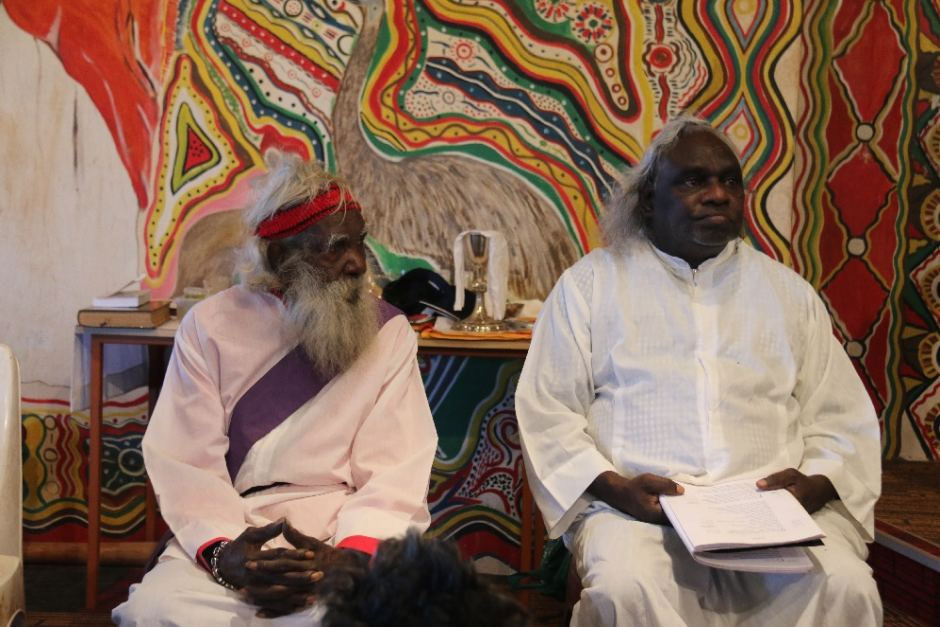
Deacon Boniface (left) at his brother's funeral. Photo courtesy https://www.abc.net.au
National Aboriginal and Torres Strait Islander Catholic Council
'The peak Indigenous advisory body to the Catholic Church'
80C Payneham Rd.
Stepney SA 5069
www.natsicc.org.au | craig@natsicc.org.au | 08 8363 2963
